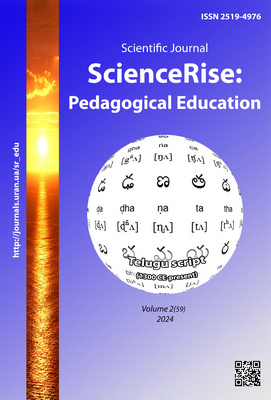Hard and soft skills development of higher maritime educational institutions cadets while studying the discipline "Maritime English"
DOI:
https://doi.org/10.15587/2519-4984.2024.304465Keywords:
interdisciplinary approach, communicative approach, competences, development and formation of skills, maritime EnglishAbstract
The article examines the problem of Hard and soft skills development of higher maritime educational institutions cadets while studying the discipline "Maritime English"; emphasis is placed on the interdisciplinary connections of the disciplines of different training cycles; it is underlined that the process of teaching maritime English future sailors should be based on a communicative approach, which will enable future specialists to realize their needs in acquiring knowledge, skills and abilities directly on board the ship, as they will work in mixed crews.
The study also pointed out the group of knowledge and skills, which are necessary for obtaining confirmation of the professional readiness for a higher education applicant, and the group of knowledge and skills, which are necessary for career promotion; it is stated that the discipline "Maritime English" in educational preparation of cadets of higher maritime educational institutions acts as a kind of synthesizer of knowledge and skills, acquired by them in the process of studying the disciplines of the professional cycle (hard skills), and at the same time provides for the formation and development of such knowledge and skills as: critical thinking, creativity, ability to work in a team, cultural awareness, communicative skills, flexibility, etc. (soft skills).
Attention is drawn to the fact that the heterogeneity of cadets' knowledge upon admission to a maritime university and their further distribution into subgroups vary the complexity and types of tasks in classes.
It has been proven that the discipline "Maritime English" is universal for preparing future specialists for their professional activities (in the aspect of developing hard and soft skills), as it integrates knowledge and skills, acquired from professionally oriented disciplines, and allows their application for the development of soft skills
References
- Busel, V. T. (Ed.) (2009). Velykyi tlumachnyi slovnyk suchasnoi ukrainskoi movy. Kyiv; Irpin: VTF «Perun», 1736.
- Honcharenko, S. U. (1997). Ukrainskyi pedahohichnyi slovnyk. Kyiv: Lybid, 376.
- Tanko, T. P. (2004). Teoriia ta praktyka muzychno-pedahohichnoi pidhotovky maibutnikh vykhovateliv doshkilnykh zakladiv u pedahohichnykh universytetakh. [Doctoral dissertation; Kharkivskyi derzh. pedahohichnyi un-t im. H. S. Skovorody].
- Piekhota, O. M., Starieva, A. M. (2005). Osobystisno oriientovane navchannia: pidhotovka vchytelia. Mykolaiv: Ilion, 272.
- Sokol, I. V. (2011). Formuvannia profesiinoi kompetentnosti maibutnikh sudnovodiiv u protsesi vyvchennia fakhovykh dystsyplin. [PhD dissertation; Khersonskyi derzhavnyi universytet].
- Voloshynov, S. A. (2012). Alhorytmichna pidhotovka maibutnikh sudnovodiiv z systemoiu vizualnoi pidtrymky v umovakh informatsiino-komunikatsiinoho pedahohichnoho seredovyshcha. [PhD dissertation; Khersonskyi derzhavnyi universytet].
- Heckman, J. J., Kautz, T. D. (2012). Hard Evidence on Soft Skills. Working Paper 18121; National Bureau of Economic Research. https://doi.org/10.3386/w18121
- McClelland, D. C. (1973). Testing for competence rather than for "intelligence." American Psychologist, 28 (1), 1–14. https://doi.org/10.1037/h0034092
- Robles, M. M. (2012). Executive Perceptions of the Top 10 Soft Skills Needed in Today’s Workplace. Business Communication Quarterly, 75 (4), 453–465. https://doi.org/10.1177/1080569912460400
- Mahasneh, J. K., Thabet, W. (2016). Developing a Normative Soft Skills Taxonomy for Construction Education. Journal of Civil Engeenering and Architecture Research, 3 (5), 1463–1486.
- Babiy, H. V. (2013). Analiz vymoh do osobystisnykh ta profesiynykh yakostey inzheneriv iz prohramnoho zabezpechennia v konteksti formuvannia hotovnosti do profesiynoho spilkuvannia. Science and Education a New Dimension: Pedagogy and Psychology, 7, 17–21.
- Sosnytska, O. (2029). Soft skills: miaki navychky tverdoho kharakteru. Available at: https://www.dw.com/ru/soft-skills-мягкие-навiки-твердого-характера/a-4837922
- Kochubey, T., Tkachuk, Y. (2021). The place of soft skills social skills in the system of competences of future social workers. Social Work and Social Education, 2 (7), 42–51. https://doi.org/10.31499/2618-0715.2(7).2021.244074
- Kozhenovska, T., Lisnevska, A. (2014). (2014) Vstanovlennia mizhdystsyplinarnykh zviazkiv fakhovykh dystsyplin yak skladova mizhdystsyplinarnoi intehratsii (na prykladi pidhotovky televiziinykh reporteriv) Naukovi zapysky Kirovohradskoho derzhavnoho pedahohichnoho universytetu imeni Volodymyra Vynnychenka. Seriia: Pedahohichni nauky, 132, 102–105.
- Liashenko, U. I. (2016). Pedahohichni umovy pidhotovky maibutnikh sudnovykh mekhanikiv u protsesi vyvchennia profesiino-oriientovanykh dystsyplin [PhD dissertation; Khersonskyi derzhavnyi universytet].
- Padun, N. O., Andriiv, N. Y. (2011). Osoblyvosti form intehrovanoho navchannia u suchasnii shkoli. Naukovi zapysky NDU im. M. Hoholia. Psykholoho-pedahohichni nauky, 1, 79–82.
Downloads
Published
How to Cite
Issue
Section
License
Copyright (c) 2024 Uliana Liashenko

This work is licensed under a Creative Commons Attribution 4.0 International License.
Our journal abides by the Creative Commons CC BY copyright rights and permissions for open access journals.
Authors, who are published in this journal, agree to the following conditions:
1. The authors reserve the right to authorship of the work and pass the first publication right of this work to the journal under the terms of a Creative Commons CC BY, which allows others to freely distribute the published research with the obligatory reference to the authors of the original work and the first publication of the work in this journal.
2. The authors have the right to conclude separate supplement agreements that relate to non-exclusive work distribution in the form in which it has been published by the journal (for example, to upload the work to the online storage of the journal or publish it as part of a monograph), provided that the reference to the first publication of the work in this journal is included.







